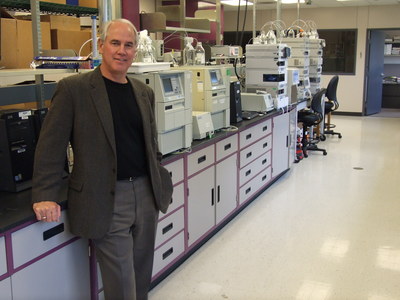Roger Newton's Esperion Therapeutics enters next phase of drug development
Biotech firm Esperion Therapeutics has entered the second phase of the government's required three-stage regulatory process to test the effectiveness of its top drug candidate, the company announced today.
The firm, led by Ann Arbor entrepreneur Roger Newton, the scientist who co-discovered "bad" cholesterol-lowering drug Lipitor, said it had started its Phase 2 clinical study for a drug currently known as ETC-1002. The drug aims to help the body fight triglycerides and LDL cholesterol.

Esperion Therapeutics CEO Roger Newton, co-discoverer of Lipitor
Nathan Bomey | AnnArbor.com
Esperion said a second Phase 2 study will be launched later this year to study the drug's other possible benefits, which the company believes could include the ability to raise "good" HDL cholesterol and regulate glucose.
The current Phase 2 study will last 12 weeks and involves 176 patients with a history of hypercholesterolemia, a condition in which patients have consistently high cholesterol.
The development of this drug is separate from Esperion's ongoing work with the Cleveland Clinic, a partnership through which researchers are developing a therapy that would lower HDL cholesterol.
The market for the therapies Esperion is developing is lucrative.
"Cardio-metabolic diseases remain the leading cause of morbidity and mortality among men and women in industrialized countries worldwide," Newton said in a statement.
Esperion operates out of the 57,000-square-foot Michigan Life Science Innovation Center in Plymouth Township, a business incubator operated by economic development group Ann Arbor SPARK.
Newton first co-founded Esperion in the late 1990s and sold it in 2004 to Pfizer for $1.3 billion. Pfizer closed its Esperion division in 2007, but Newton raised venture capital funding and licensed technology from Pfizer to restart the company in 2008.
Contact AnnArbor.com's Nathan Bomey at (734) 623-2587 or nathanbomey@annarbor.com. You can also follow him on Twitter or subscribe to AnnArbor.com's newsletters.


Comments
Nathan Bomey
Thu, Jan 6, 2011 : 10:47 a.m.
Yes, absolutely that should be "raise" HDL cholesterol. Thanks for catching that. I just fixed it. As you can see from our previous coverage, raising HDL cholesterol is a huge challenge for the entire biotech industry but is similarly considered an enormous opportunity: http://www.annarbor.com/business-review/esperion-therapeutics-launches-first-clinical-trial/ http://www.annarbor.com/business-review/roger-newton-economy-alters-strategy-for-second-esperion-therapeutics/ http://www.annarbor.com/business-review/roger-newton-commercializing-cholesterol-treatment-will-depend-on-partnerships/ http://www.annarbor.com/business-review/roger-newtons-esperion-therapeutics-signs-research-deal-with-cleveland-clinic/
Somewhat Concerned
Thu, Jan 6, 2011 : 10:43 a.m.
If the story can get a fact that is printed in the company's material so totally wrong, how can we trust whatever we read? Doesn't anyone do any fact checking or at least talk to a second source to see if things make sense? Does one just listen to a company that makes claims and do no checking? In this case, not only does there seem to be no contacting any of the experts readily available in A2 to see if the claims are as real as the company claims, the story does not even get the claims right. What other facts reported by AnnArbor.com are equally wrong?
rm
Thu, Jan 6, 2011 : 10:34 a.m.
RockCreek and Ace Ventura are surely correct that the compound entering Phase 2 clinical trials is thought to raise HDL, not lower it. This is from the press release at the beginning of the now-completed Phase 1 clinical trial: "ETC-1002 therefore has the potential to lower LDL-C and triglycerides and also to increase HDL-C." (emphasis added) http://www.esperion.com/modules/news/article.php?storyid=25 (from Esperion's website)
Ace Ventura
Thu, Jan 6, 2011 : 10:17 a.m.
"ability to lower "good" HDL cholesterol and regulate glucose." I bet "lower" is a type-O and it should say "raise"
RockCreek
Thu, Jan 6, 2011 : 10:07 a.m.
I suspect that neither the Phase II work nor the partnership with The Cleveland Clinic are intended to detect beneficial effects of lowering HDL cholesterol. Generally one tries to lower LDL cholesterol and have a higher ratio of HDL to LDL cholesterol. You might want to double check with the company. Also, the main purpose of Phase I studies is to convince yourself and the FDA that the drug is safe, not that it is effective. Again, check with the company.